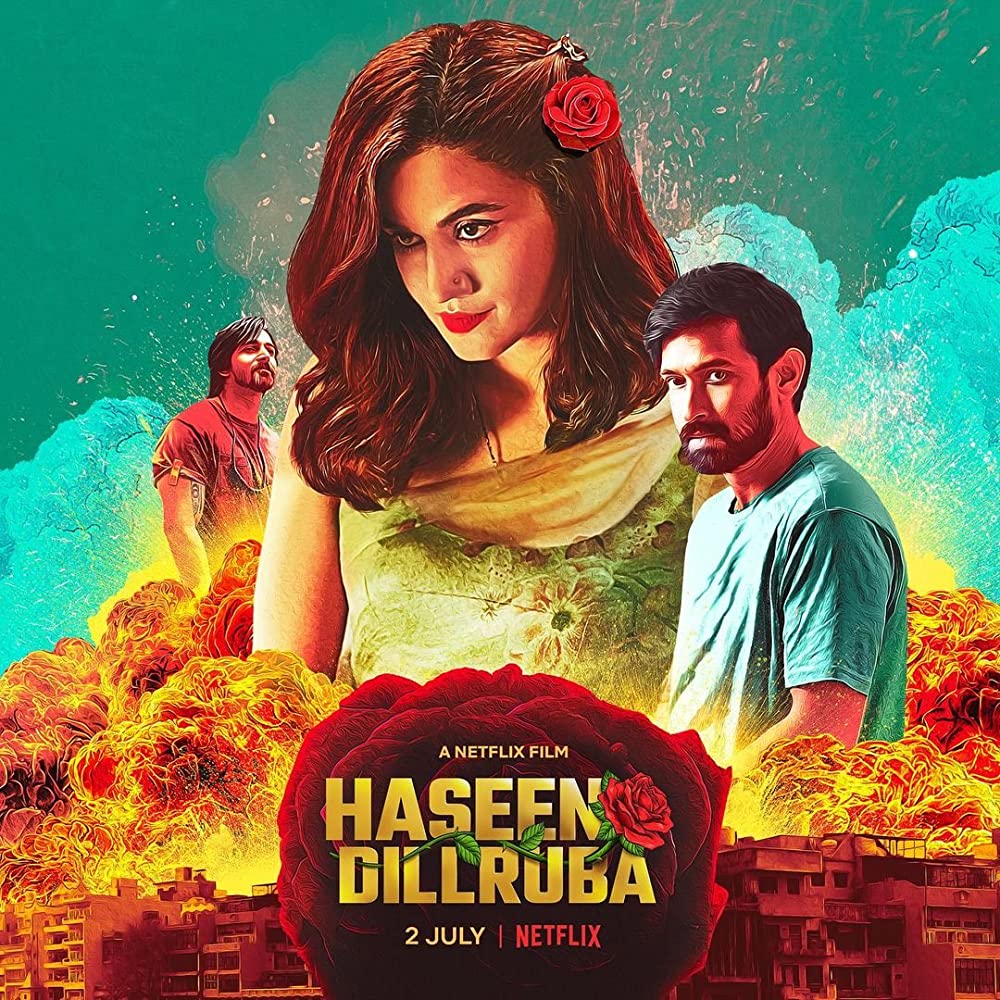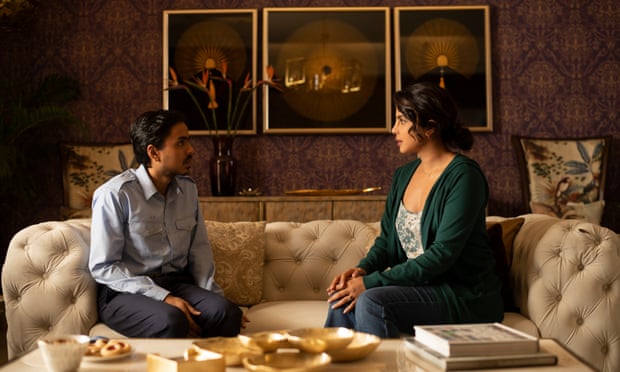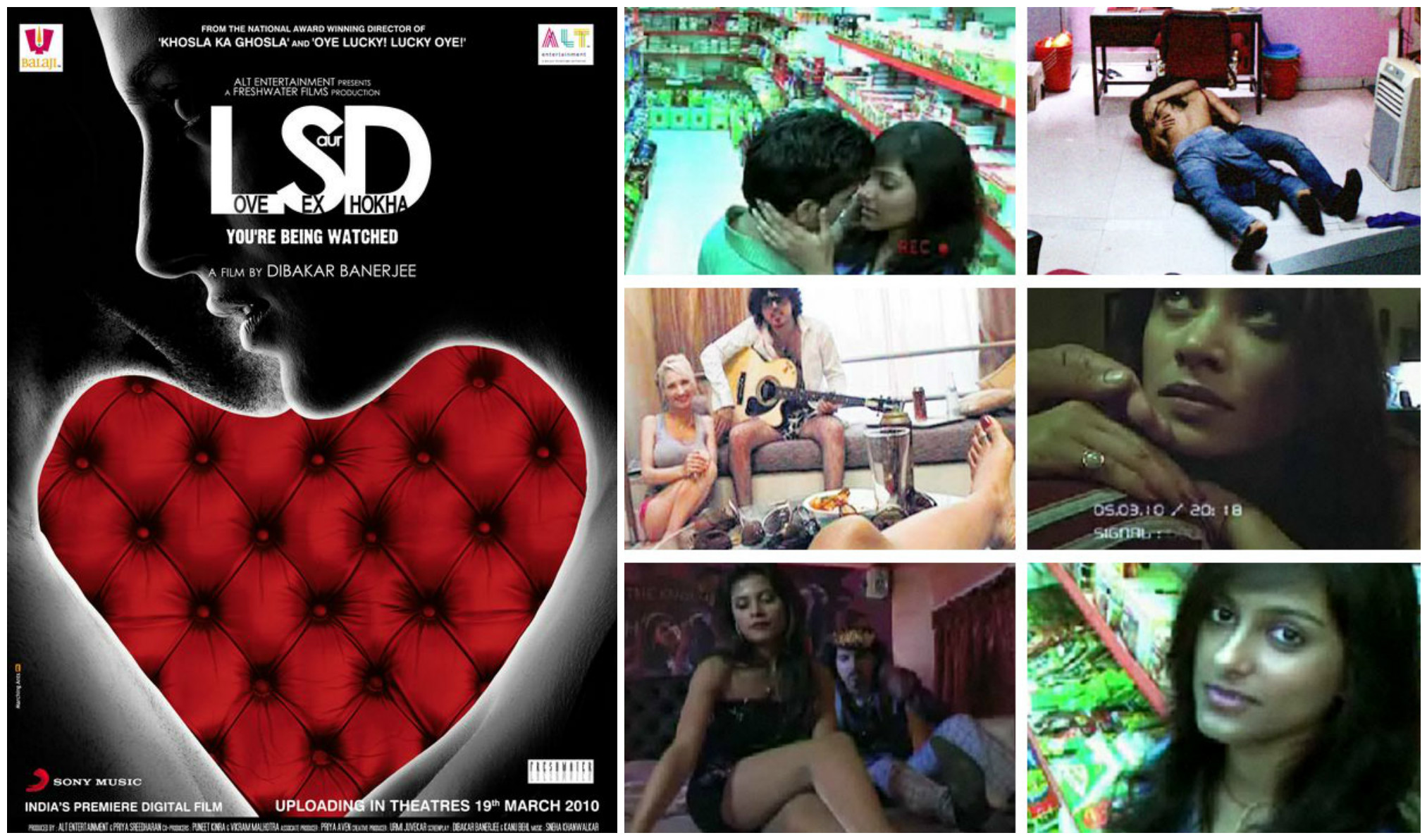HASEEN DILLRUBA
HASEEN DILLRUBA : MOVIE REVIEW
2.5 STARS OUT OF 5 ( ABOVE AVERAGE )
SCRIPTWRITER : KANIKA DHILLON
DIRECTOR : VINIL MATTHEW
CAST : TAAPSEE PANNU, VIKRANT MASSEY, HARSHVARDHAN RANE
As I watched with escalating admiration, with the movie’s initial passable phase giving way to daring twists and exhilarating turns, the heart and mind wanted to heap dollops of praise on scriptwriter Kanika Dhillon and director Vinil Matthew, but then, at the last leg, someone took a frozen leg of lamb and smashed it on my skull, and I collapsed to the ground, an ooze of scarlet steadily streaming forth, never to return to the promised halcyon.
Frowsy boy meets beautiful sexy girl in the lottery of arranged marriage. By some miracle, she is still available and they get hitched in a U.P waterside town. Marriage doesn’t exactly maroon them in silken paradises of fun, moans and squeals. Boy’s shy, Girl’s crestfallen and pikchar shuru bhi nahin hua, yet we unable to achieve the much needed climax. Dip into the Ganges of Cinema, fish out the cousin from ‘Charulata’ and drop him into the mix – but beware that this chokra is naughtier and pic erupts into personal apocalypse and currents-‘n’-eddies of dangerous intent that gloriously kick up the tale. One can’t believe how good it gets, but wait ! you really don’t know what the ending has in store for you.
‘Haseen Dilruba’ is a golden example of the underestimated power of a script to resurrect or kill a movie. We may go eternally gaga over our superstars and some cineastes may spare a thought for the director, but none of them can shake a fig if the script decides to go the way of the Titanic. A solidly good script from start to finish is like a good unexpected romp in the morning – from there, if you plan well, things can only get better. The whole team is happy and bolstered by what they have on hand, parlaying the promise of a good body to flesh out even greater heights. On the contrary, a script with a fatal flaw is a burnt dish, and you really can’t put a spin on it, wanly serving it dead on arrival to an expectant audience.
Producer Aanand L. Rai & Co. plant their pic in Jwalapur, a nice waterside locality in Haridwar, where some houses line the river-side with beauteous potential a la Venice. Rishu (Vikrant Massey) scores a hattrick on second try when he wins the hand of Rani (Taapsee Pannu). He’s the reserved nerdish type but clearly has a taste for fine women as Rani wows him with her effervescent nature and then some more. Marriage happens in the blink of a kohl-lined eye but her mehndi doesn’t actually peel off after what happens next. He’s an engineer who’s able to fix her home’s broken fan, but isn’t able to figure out the mechanics of what makes her tick, even after her provocative figure straddles him, nightly, on the conjugal cushion. Rishu’s matronly, shrewish mother and catatonic father might have leached the life out of him – a limp spark that Rani struggles to kindle.
Enter Neel (Harshvardhan) – Rishu’s muscular, hunky cousin. Neel’s everything Rishu’s not and also a lot of what Rani wants in her man – debonair, dashing, flirtatious (to her, not others). Hell brims over and ignites a series of events that transform our understanding of the shenanigans this trio will paint.
Director Vinil Matthew handles most of the film well, pacing the film decently and impressively directing the emotional orchestration of characters. There is a scene of a car chasing a bike through road, bridge and fields that is shot with racy slickness and multiple angles. He is good with the macro-structure, but letting a given scene play a little more deliberately, amplifying the gravitas in it, or using close-ups to immersive effect are not his forte. The film suffers on this count, salvaged as it is by a constantly whirring script and interesting dialogues. Scenes of intimacy are slack – one impromptu love-making scene in a shed has the done-to-death Indian filmy shtick of the man gnawing to the bone the neck of the woman while the camera does not dare travel anywhere down, thanks to the Censor Board, shy artistes, coy directors and morality-screaming culture-police. We welcome ‘Basic Instinct’, but in our own pictures the No.1 rule is to show sex scenes in a way that resemble everything other than actual sex. Jai Ho !
The real Hunterwaali is Kanika Dhillon, the scriptwriter, who whips this chariot into glorious wilderness, never mind what happened to her at the end. Surprises galore await, as Dhillon makes her characters develop a mind of their own. A devastating cudgel of news delivered over a finger-licking good meal of mutton is receiving with unexpected shades. Characters transform chillingly after this, and yes it is plausible – push people past a certain limit and while some may remain innocuous, do not expect everyone to remain so. A piteous dialogue uttered atop a terrace wall, with a plunge to the cold lake on the other side awaiting, is simply smashing in its innocence and poignancy. Eve-teasing, a particular plague in India, is shown to teeth-gritting, knuckle-cracking provocation. Pic thus roils on multiple depths.
The lunacy and carelessness with which the secret finale is finally shown, crushes the quality of the film. It severely disappoints to see all the good work besmirched with that ending hack job. Dhillon crashed at this juncture, but Matthew could have changed subtle track to record the scene with more convincing emotional persuasion, making use of the dire, frantic ethos in a more mature way. He doesn’t, opting to film it with a tearing cartoonishness. If the film had ended fifteen minutes before, it would still have been an excellent film, but what then transpires amounts to sorry murder.
Stabs of humour to leaven this thriller are sought to be provided by Rishab’s hard-to-please mother and a police inspector whose severe demeanour is peppered with light-hearted jabs – both efforts are rather clumsy and unsuccessful. Aditya Srivastav whose role as the legendary kick-ass young inspector in ‘Satya’ glints till this day, is a pale bloated shadow of that self here as another police inspector. Vikrant Massey excels though as Rishu, the innocuous young husband morphing into an unrecognizable animal. Harshvardhan Rane’s one-dimensional persona is a ham-handed one, whereas it could have been a lot slyer.
The hero of the film is Taapsee Pannu. It does not matter what the script eventually does, she stands tall and stunning as one of modern Indian cinema’s spunkier yet moving performers. God-given beauty is possessed by a thousand other actresses, but Pannu has that special physiognomy where after all the chutzpah and cheek roll over, there’s a haunting tenderness that lingers, with a layer of resilience still there as back-up. It’s Punjab’s best in one interesting lady. Her character took quite a tumble in the excellent ‘Manmariyan’ and here too she is not spared some brutal rounds of the block, but she rolls with the punches, wry smiles coupled with dead-pan deliveries. Her men may be hopeless boys, but she knows she is a woman.
UPN
UPNWORLD welcomes your comments.










0 COMMENTS
WRITE COMMENT